Conference Paper: Emerging Issues of Transnational Crime in Australia
VerifiedAdded on 2022/09/12
|5
|1760
|27
Report
AI Summary
This conference paper critically analyzes emerging issues in transnational crime within Australia. It addresses the complexities of organized crime, including money laundering, cybercrime, and the use of new technologies. The paper examines the Australian government's legislative and policy responses, such as amendments to the Telecommunications (Interception and Access) Act and the Anti-Money Laundering and Counter-Terrorism Financing Amendment Act. It highlights challenges related to combating money laundering, the role of unexplained wealth, and the evolving nature of transnational criminal activities. The paper concludes by emphasizing the ongoing need for strategic and operational adjustments to effectively combat transnational crime and protect national security. The paper references several academic sources to support its findings and recommendations.
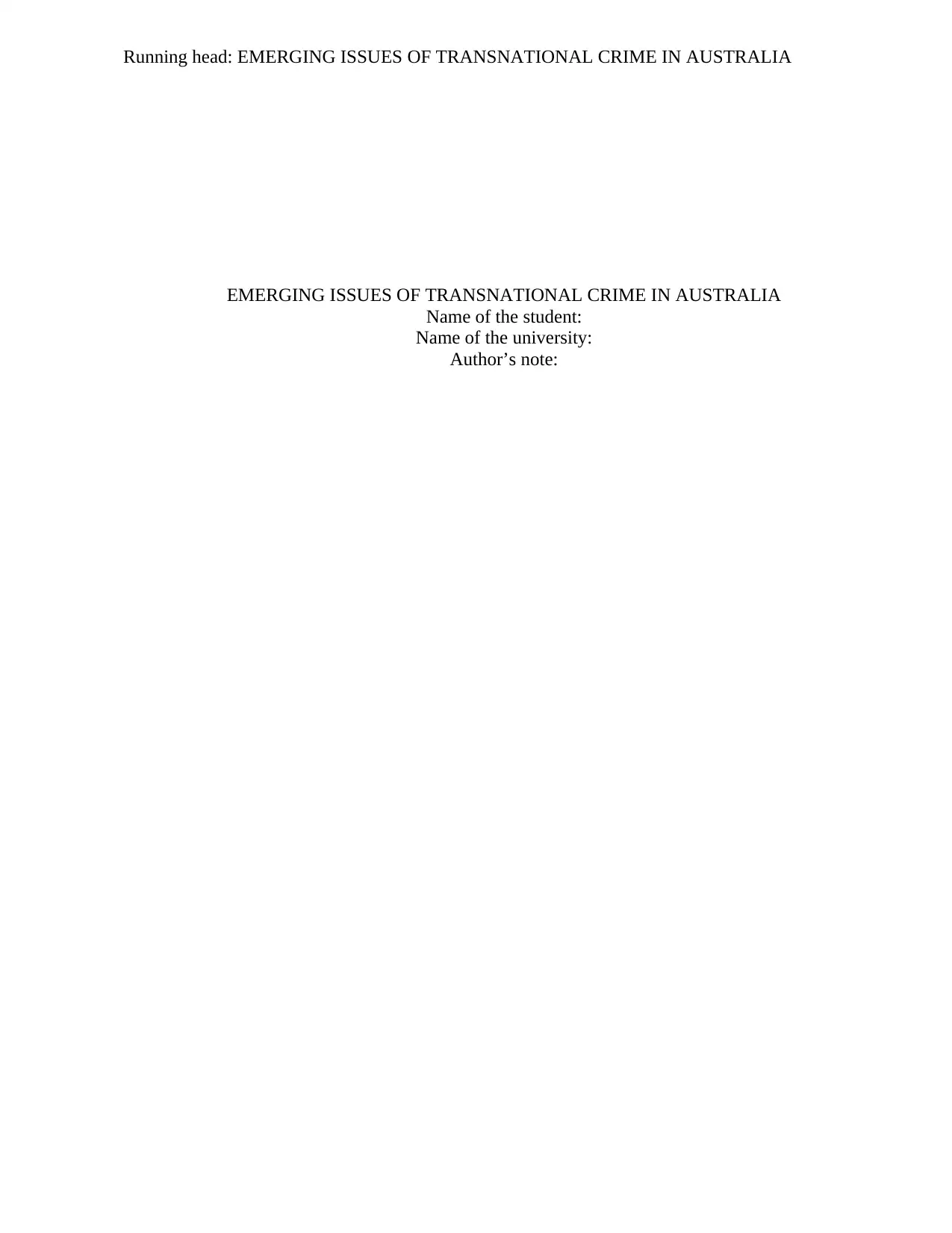
Running head: EMERGING ISSUES OF TRANSNATIONAL CRIME IN AUSTRALIA
0
EMERGING ISSUES OF TRANSNATIONAL CRIME IN AUSTRALIA
Name of the student:
Name of the university:
Author’s note:
0
EMERGING ISSUES OF TRANSNATIONAL CRIME IN AUSTRALIA
Name of the student:
Name of the university:
Author’s note:
Paraphrase This Document
Need a fresh take? Get an instant paraphrase of this document with our AI Paraphraser
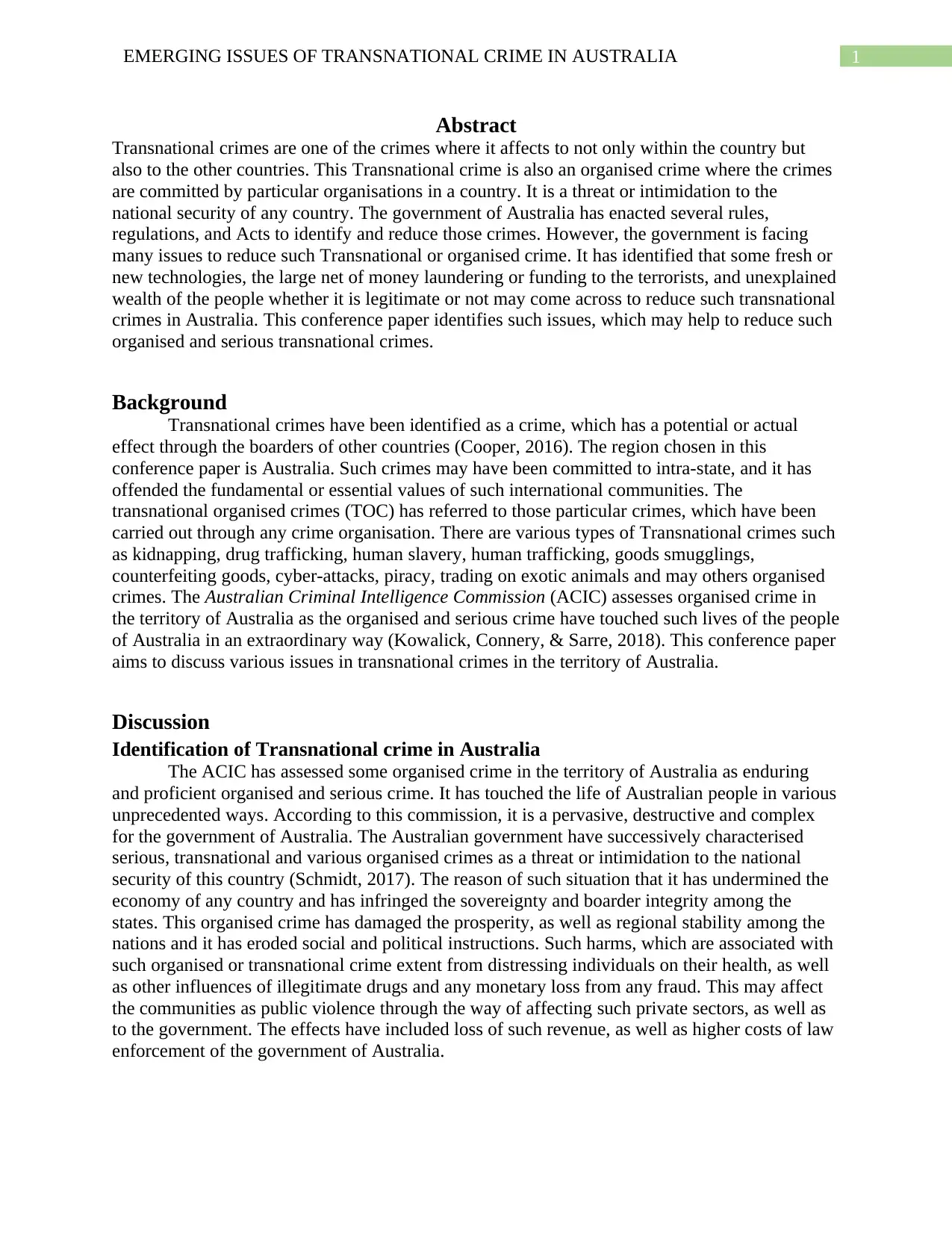
1EMERGING ISSUES OF TRANSNATIONAL CRIME IN AUSTRALIA
Abstract
Transnational crimes are one of the crimes where it affects to not only within the country but
also to the other countries. This Transnational crime is also an organised crime where the crimes
are committed by particular organisations in a country. It is a threat or intimidation to the
national security of any country. The government of Australia has enacted several rules,
regulations, and Acts to identify and reduce those crimes. However, the government is facing
many issues to reduce such Transnational or organised crime. It has identified that some fresh or
new technologies, the large net of money laundering or funding to the terrorists, and unexplained
wealth of the people whether it is legitimate or not may come across to reduce such transnational
crimes in Australia. This conference paper identifies such issues, which may help to reduce such
organised and serious transnational crimes.
Background
Transnational crimes have been identified as a crime, which has a potential or actual
effect through the boarders of other countries (Cooper, 2016). The region chosen in this
conference paper is Australia. Such crimes may have been committed to intra-state, and it has
offended the fundamental or essential values of such international communities. The
transnational organised crimes (TOC) has referred to those particular crimes, which have been
carried out through any crime organisation. There are various types of Transnational crimes such
as kidnapping, drug trafficking, human slavery, human trafficking, goods smugglings,
counterfeiting goods, cyber-attacks, piracy, trading on exotic animals and may others organised
crimes. The Australian Criminal Intelligence Commission (ACIC) assesses organised crime in
the territory of Australia as the organised and serious crime have touched such lives of the people
of Australia in an extraordinary way (Kowalick, Connery, & Sarre, 2018). This conference paper
aims to discuss various issues in transnational crimes in the territory of Australia.
Discussion
Identification of Transnational crime in Australia
The ACIC has assessed some organised crime in the territory of Australia as enduring
and proficient organised and serious crime. It has touched the life of Australian people in various
unprecedented ways. According to this commission, it is a pervasive, destructive and complex
for the government of Australia. The Australian government have successively characterised
serious, transnational and various organised crimes as a threat or intimidation to the national
security of this country (Schmidt, 2017). The reason of such situation that it has undermined the
economy of any country and has infringed the sovereignty and boarder integrity among the
states. This organised crime has damaged the prosperity, as well as regional stability among the
nations and it has eroded social and political instructions. Such harms, which are associated with
such organised or transnational crime extent from distressing individuals on their health, as well
as other influences of illegitimate drugs and any monetary loss from any fraud. This may affect
the communities as public violence through the way of affecting such private sectors, as well as
to the government. The effects have included loss of such revenue, as well as higher costs of law
enforcement of the government of Australia.
Abstract
Transnational crimes are one of the crimes where it affects to not only within the country but
also to the other countries. This Transnational crime is also an organised crime where the crimes
are committed by particular organisations in a country. It is a threat or intimidation to the
national security of any country. The government of Australia has enacted several rules,
regulations, and Acts to identify and reduce those crimes. However, the government is facing
many issues to reduce such Transnational or organised crime. It has identified that some fresh or
new technologies, the large net of money laundering or funding to the terrorists, and unexplained
wealth of the people whether it is legitimate or not may come across to reduce such transnational
crimes in Australia. This conference paper identifies such issues, which may help to reduce such
organised and serious transnational crimes.
Background
Transnational crimes have been identified as a crime, which has a potential or actual
effect through the boarders of other countries (Cooper, 2016). The region chosen in this
conference paper is Australia. Such crimes may have been committed to intra-state, and it has
offended the fundamental or essential values of such international communities. The
transnational organised crimes (TOC) has referred to those particular crimes, which have been
carried out through any crime organisation. There are various types of Transnational crimes such
as kidnapping, drug trafficking, human slavery, human trafficking, goods smugglings,
counterfeiting goods, cyber-attacks, piracy, trading on exotic animals and may others organised
crimes. The Australian Criminal Intelligence Commission (ACIC) assesses organised crime in
the territory of Australia as the organised and serious crime have touched such lives of the people
of Australia in an extraordinary way (Kowalick, Connery, & Sarre, 2018). This conference paper
aims to discuss various issues in transnational crimes in the territory of Australia.
Discussion
Identification of Transnational crime in Australia
The ACIC has assessed some organised crime in the territory of Australia as enduring
and proficient organised and serious crime. It has touched the life of Australian people in various
unprecedented ways. According to this commission, it is a pervasive, destructive and complex
for the government of Australia. The Australian government have successively characterised
serious, transnational and various organised crimes as a threat or intimidation to the national
security of this country (Schmidt, 2017). The reason of such situation that it has undermined the
economy of any country and has infringed the sovereignty and boarder integrity among the
states. This organised crime has damaged the prosperity, as well as regional stability among the
nations and it has eroded social and political instructions. Such harms, which are associated with
such organised or transnational crime extent from distressing individuals on their health, as well
as other influences of illegitimate drugs and any monetary loss from any fraud. This may affect
the communities as public violence through the way of affecting such private sectors, as well as
to the government. The effects have included loss of such revenue, as well as higher costs of law
enforcement of the government of Australia.
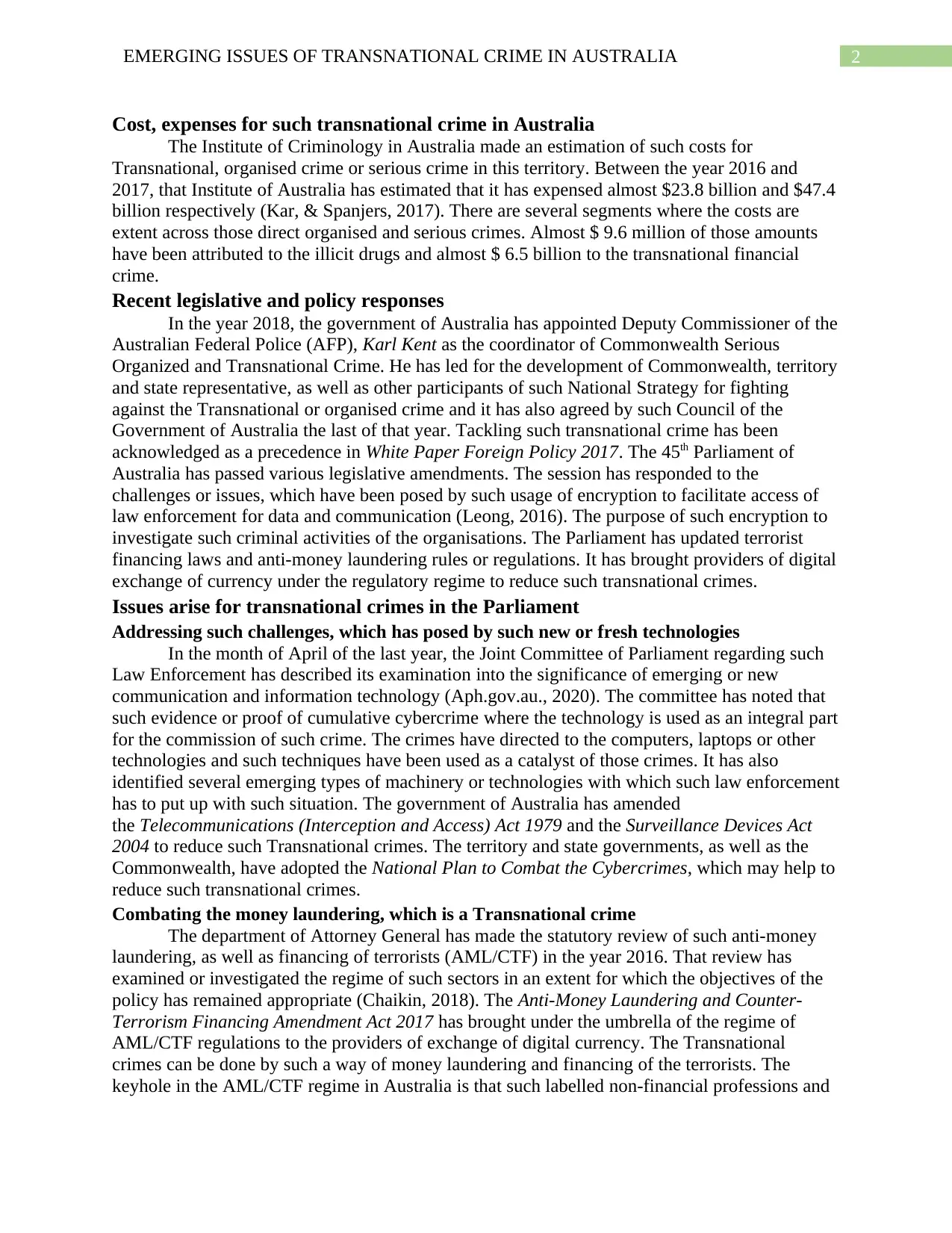
2EMERGING ISSUES OF TRANSNATIONAL CRIME IN AUSTRALIA
Cost, expenses for such transnational crime in Australia
The Institute of Criminology in Australia made an estimation of such costs for
Transnational, organised crime or serious crime in this territory. Between the year 2016 and
2017, that Institute of Australia has estimated that it has expensed almost $23.8 billion and $47.4
billion respectively (Kar, & Spanjers, 2017). There are several segments where the costs are
extent across those direct organised and serious crimes. Almost $ 9.6 million of those amounts
have been attributed to the illicit drugs and almost $ 6.5 billion to the transnational financial
crime.
Recent legislative and policy responses
In the year 2018, the government of Australia has appointed Deputy Commissioner of the
Australian Federal Police (AFP), Karl Kent as the coordinator of Commonwealth Serious
Organized and Transnational Crime. He has led for the development of Commonwealth, territory
and state representative, as well as other participants of such National Strategy for fighting
against the Transnational or organised crime and it has also agreed by such Council of the
Government of Australia the last of that year. Tackling such transnational crime has been
acknowledged as a precedence in White Paper Foreign Policy 2017. The 45th Parliament of
Australia has passed various legislative amendments. The session has responded to the
challenges or issues, which have been posed by such usage of encryption to facilitate access of
law enforcement for data and communication (Leong, 2016). The purpose of such encryption to
investigate such criminal activities of the organisations. The Parliament has updated terrorist
financing laws and anti-money laundering rules or regulations. It has brought providers of digital
exchange of currency under the regulatory regime to reduce such transnational crimes.
Issues arise for transnational crimes in the Parliament
Addressing such challenges, which has posed by such new or fresh technologies
In the month of April of the last year, the Joint Committee of Parliament regarding such
Law Enforcement has described its examination into the significance of emerging or new
communication and information technology (Aph.gov.au., 2020). The committee has noted that
such evidence or proof of cumulative cybercrime where the technology is used as an integral part
for the commission of such crime. The crimes have directed to the computers, laptops or other
technologies and such techniques have been used as a catalyst of those crimes. It has also
identified several emerging types of machinery or technologies with which such law enforcement
has to put up with such situation. The government of Australia has amended
the Telecommunications (Interception and Access) Act 1979 and the Surveillance Devices Act
2004 to reduce such Transnational crimes. The territory and state governments, as well as the
Commonwealth, have adopted the National Plan to Combat the Cybercrimes, which may help to
reduce such transnational crimes.
Combating the money laundering, which is a Transnational crime
The department of Attorney General has made the statutory review of such anti-money
laundering, as well as financing of terrorists (AML/CTF) in the year 2016. That review has
examined or investigated the regime of such sectors in an extent for which the objectives of the
policy has remained appropriate (Chaikin, 2018). The Anti-Money Laundering and Counter-
Terrorism Financing Amendment Act 2017 has brought under the umbrella of the regime of
AML/CTF regulations to the providers of exchange of digital currency. The Transnational
crimes can be done by such a way of money laundering and financing of the terrorists. The
keyhole in the AML/CTF regime in Australia is that such labelled non-financial professions and
Cost, expenses for such transnational crime in Australia
The Institute of Criminology in Australia made an estimation of such costs for
Transnational, organised crime or serious crime in this territory. Between the year 2016 and
2017, that Institute of Australia has estimated that it has expensed almost $23.8 billion and $47.4
billion respectively (Kar, & Spanjers, 2017). There are several segments where the costs are
extent across those direct organised and serious crimes. Almost $ 9.6 million of those amounts
have been attributed to the illicit drugs and almost $ 6.5 billion to the transnational financial
crime.
Recent legislative and policy responses
In the year 2018, the government of Australia has appointed Deputy Commissioner of the
Australian Federal Police (AFP), Karl Kent as the coordinator of Commonwealth Serious
Organized and Transnational Crime. He has led for the development of Commonwealth, territory
and state representative, as well as other participants of such National Strategy for fighting
against the Transnational or organised crime and it has also agreed by such Council of the
Government of Australia the last of that year. Tackling such transnational crime has been
acknowledged as a precedence in White Paper Foreign Policy 2017. The 45th Parliament of
Australia has passed various legislative amendments. The session has responded to the
challenges or issues, which have been posed by such usage of encryption to facilitate access of
law enforcement for data and communication (Leong, 2016). The purpose of such encryption to
investigate such criminal activities of the organisations. The Parliament has updated terrorist
financing laws and anti-money laundering rules or regulations. It has brought providers of digital
exchange of currency under the regulatory regime to reduce such transnational crimes.
Issues arise for transnational crimes in the Parliament
Addressing such challenges, which has posed by such new or fresh technologies
In the month of April of the last year, the Joint Committee of Parliament regarding such
Law Enforcement has described its examination into the significance of emerging or new
communication and information technology (Aph.gov.au., 2020). The committee has noted that
such evidence or proof of cumulative cybercrime where the technology is used as an integral part
for the commission of such crime. The crimes have directed to the computers, laptops or other
technologies and such techniques have been used as a catalyst of those crimes. It has also
identified several emerging types of machinery or technologies with which such law enforcement
has to put up with such situation. The government of Australia has amended
the Telecommunications (Interception and Access) Act 1979 and the Surveillance Devices Act
2004 to reduce such Transnational crimes. The territory and state governments, as well as the
Commonwealth, have adopted the National Plan to Combat the Cybercrimes, which may help to
reduce such transnational crimes.
Combating the money laundering, which is a Transnational crime
The department of Attorney General has made the statutory review of such anti-money
laundering, as well as financing of terrorists (AML/CTF) in the year 2016. That review has
examined or investigated the regime of such sectors in an extent for which the objectives of the
policy has remained appropriate (Chaikin, 2018). The Anti-Money Laundering and Counter-
Terrorism Financing Amendment Act 2017 has brought under the umbrella of the regime of
AML/CTF regulations to the providers of exchange of digital currency. The Transnational
crimes can be done by such a way of money laundering and financing of the terrorists. The
keyhole in the AML/CTF regime in Australia is that such labelled non-financial professions and
⊘ This is a preview!⊘
Do you want full access?
Subscribe today to unlock all pages.

Trusted by 1+ million students worldwide
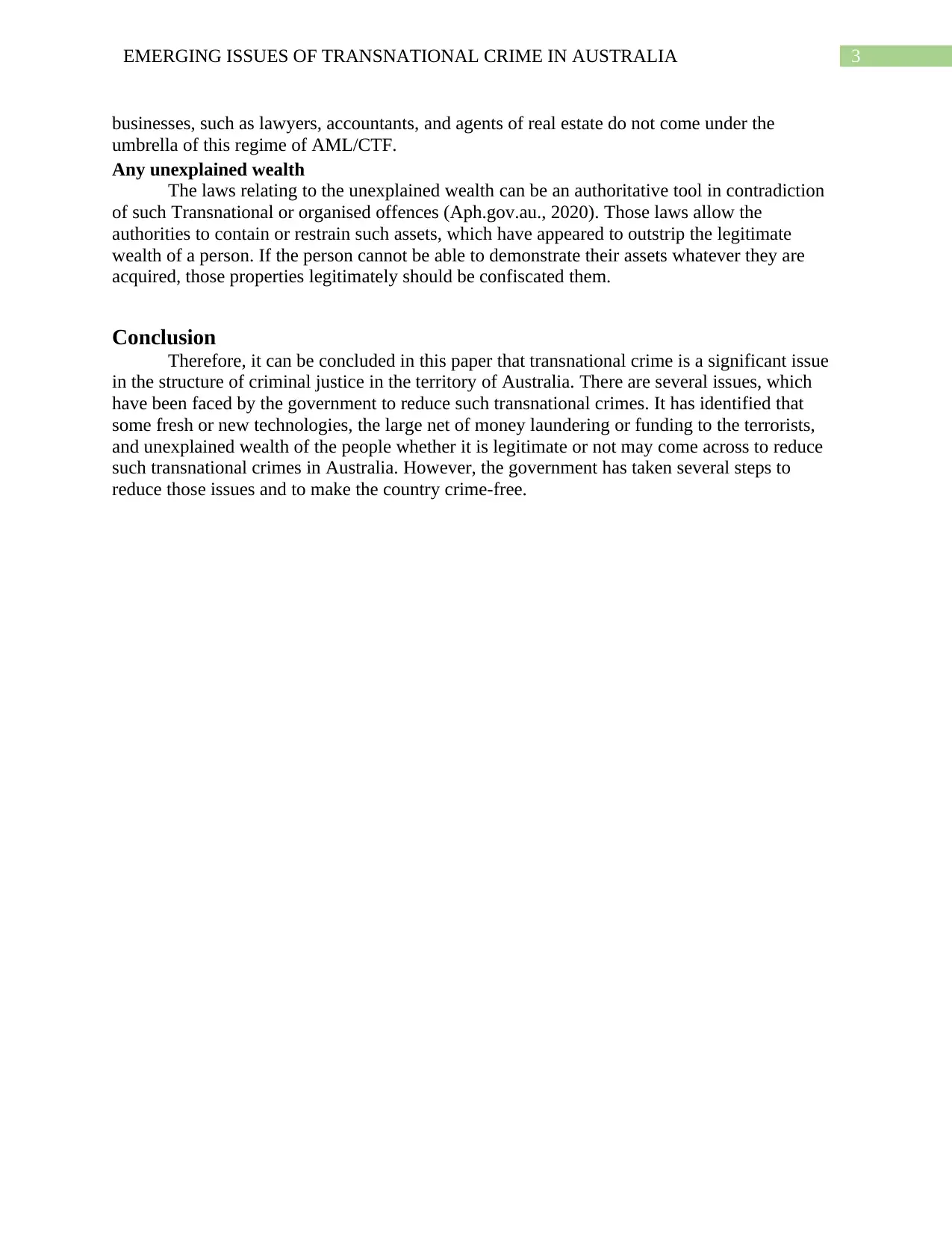
3EMERGING ISSUES OF TRANSNATIONAL CRIME IN AUSTRALIA
businesses, such as lawyers, accountants, and agents of real estate do not come under the
umbrella of this regime of AML/CTF.
Any unexplained wealth
The laws relating to the unexplained wealth can be an authoritative tool in contradiction
of such Transnational or organised offences (Aph.gov.au., 2020). Those laws allow the
authorities to contain or restrain such assets, which have appeared to outstrip the legitimate
wealth of a person. If the person cannot be able to demonstrate their assets whatever they are
acquired, those properties legitimately should be confiscated them.
Conclusion
Therefore, it can be concluded in this paper that transnational crime is a significant issue
in the structure of criminal justice in the territory of Australia. There are several issues, which
have been faced by the government to reduce such transnational crimes. It has identified that
some fresh or new technologies, the large net of money laundering or funding to the terrorists,
and unexplained wealth of the people whether it is legitimate or not may come across to reduce
such transnational crimes in Australia. However, the government has taken several steps to
reduce those issues and to make the country crime-free.
businesses, such as lawyers, accountants, and agents of real estate do not come under the
umbrella of this regime of AML/CTF.
Any unexplained wealth
The laws relating to the unexplained wealth can be an authoritative tool in contradiction
of such Transnational or organised offences (Aph.gov.au., 2020). Those laws allow the
authorities to contain or restrain such assets, which have appeared to outstrip the legitimate
wealth of a person. If the person cannot be able to demonstrate their assets whatever they are
acquired, those properties legitimately should be confiscated them.
Conclusion
Therefore, it can be concluded in this paper that transnational crime is a significant issue
in the structure of criminal justice in the territory of Australia. There are several issues, which
have been faced by the government to reduce such transnational crimes. It has identified that
some fresh or new technologies, the large net of money laundering or funding to the terrorists,
and unexplained wealth of the people whether it is legitimate or not may come across to reduce
such transnational crimes in Australia. However, the government has taken several steps to
reduce those issues and to make the country crime-free.
Paraphrase This Document
Need a fresh take? Get an instant paraphrase of this document with our AI Paraphraser
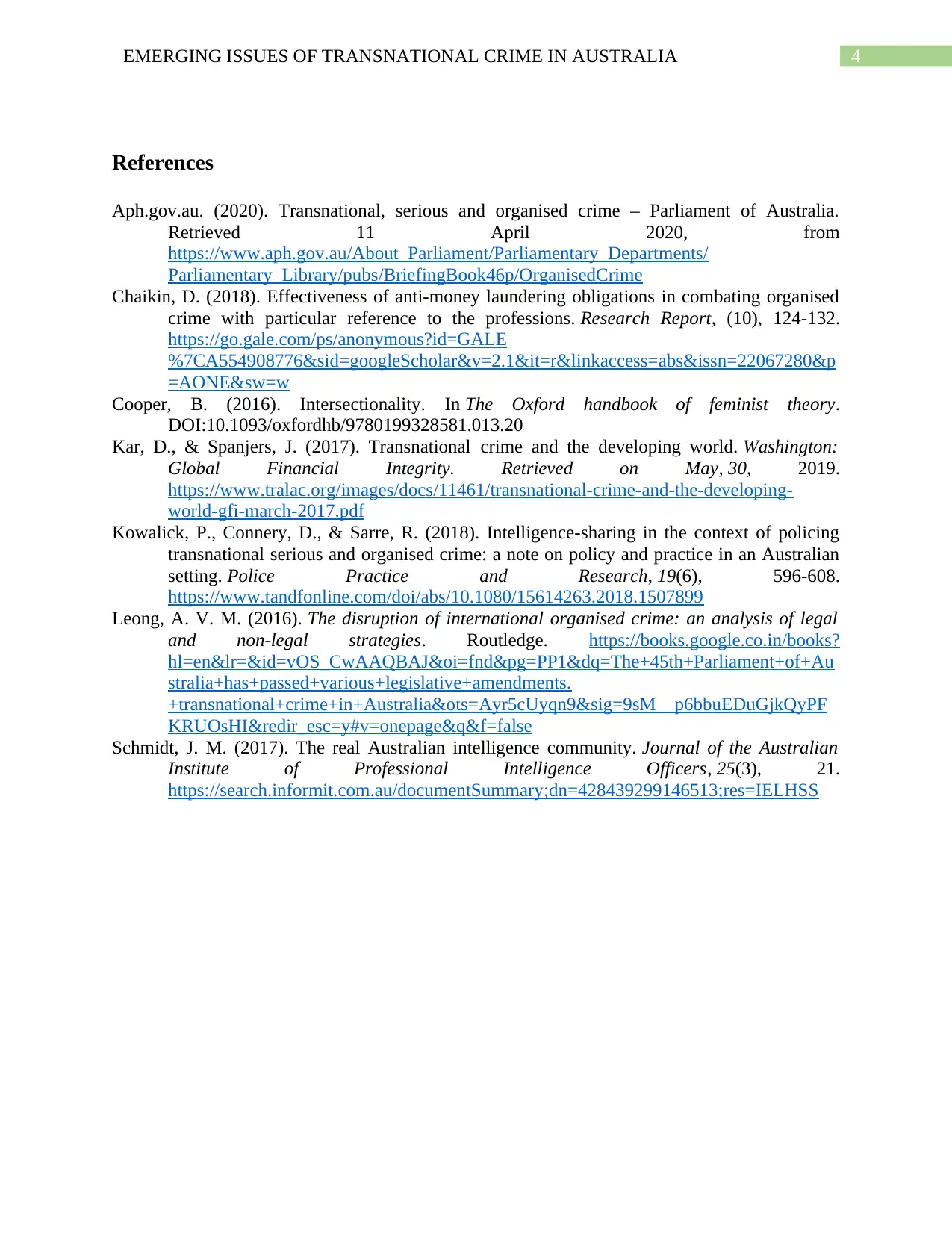
4EMERGING ISSUES OF TRANSNATIONAL CRIME IN AUSTRALIA
References
Aph.gov.au. (2020). Transnational, serious and organised crime – Parliament of Australia.
Retrieved 11 April 2020, from
https://www.aph.gov.au/About_Parliament/Parliamentary_Departments/
Parliamentary_Library/pubs/BriefingBook46p/OrganisedCrime
Chaikin, D. (2018). Effectiveness of anti-money laundering obligations in combating organised
crime with particular reference to the professions. Research Report, (10), 124-132.
https://go.gale.com/ps/anonymous?id=GALE
%7CA554908776&sid=googleScholar&v=2.1&it=r&linkaccess=abs&issn=22067280&p
=AONE&sw=w
Cooper, B. (2016). Intersectionality. In The Oxford handbook of feminist theory.
DOI:10.1093/oxfordhb/9780199328581.013.20
Kar, D., & Spanjers, J. (2017). Transnational crime and the developing world. Washington:
Global Financial Integrity. Retrieved on May, 30, 2019.
https://www.tralac.org/images/docs/11461/transnational-crime-and-the-developing-
world-gfi-march-2017.pdf
Kowalick, P., Connery, D., & Sarre, R. (2018). Intelligence-sharing in the context of policing
transnational serious and organised crime: a note on policy and practice in an Australian
setting. Police Practice and Research, 19(6), 596-608.
https://www.tandfonline.com/doi/abs/10.1080/15614263.2018.1507899
Leong, A. V. M. (2016). The disruption of international organised crime: an analysis of legal
and non-legal strategies. Routledge. https://books.google.co.in/books?
hl=en&lr=&id=vOS_CwAAQBAJ&oi=fnd&pg=PP1&dq=The+45th+Parliament+of+Au
stralia+has+passed+various+legislative+amendments.
+transnational+crime+in+Australia&ots=Ayr5cUyqn9&sig=9sM__p6bbuEDuGjkQyPF
KRUOsHI&redir_esc=y#v=onepage&q&f=false
Schmidt, J. M. (2017). The real Australian intelligence community. Journal of the Australian
Institute of Professional Intelligence Officers, 25(3), 21.
https://search.informit.com.au/documentSummary;dn=428439299146513;res=IELHSS
References
Aph.gov.au. (2020). Transnational, serious and organised crime – Parliament of Australia.
Retrieved 11 April 2020, from
https://www.aph.gov.au/About_Parliament/Parliamentary_Departments/
Parliamentary_Library/pubs/BriefingBook46p/OrganisedCrime
Chaikin, D. (2018). Effectiveness of anti-money laundering obligations in combating organised
crime with particular reference to the professions. Research Report, (10), 124-132.
https://go.gale.com/ps/anonymous?id=GALE
%7CA554908776&sid=googleScholar&v=2.1&it=r&linkaccess=abs&issn=22067280&p
=AONE&sw=w
Cooper, B. (2016). Intersectionality. In The Oxford handbook of feminist theory.
DOI:10.1093/oxfordhb/9780199328581.013.20
Kar, D., & Spanjers, J. (2017). Transnational crime and the developing world. Washington:
Global Financial Integrity. Retrieved on May, 30, 2019.
https://www.tralac.org/images/docs/11461/transnational-crime-and-the-developing-
world-gfi-march-2017.pdf
Kowalick, P., Connery, D., & Sarre, R. (2018). Intelligence-sharing in the context of policing
transnational serious and organised crime: a note on policy and practice in an Australian
setting. Police Practice and Research, 19(6), 596-608.
https://www.tandfonline.com/doi/abs/10.1080/15614263.2018.1507899
Leong, A. V. M. (2016). The disruption of international organised crime: an analysis of legal
and non-legal strategies. Routledge. https://books.google.co.in/books?
hl=en&lr=&id=vOS_CwAAQBAJ&oi=fnd&pg=PP1&dq=The+45th+Parliament+of+Au
stralia+has+passed+various+legislative+amendments.
+transnational+crime+in+Australia&ots=Ayr5cUyqn9&sig=9sM__p6bbuEDuGjkQyPF
KRUOsHI&redir_esc=y#v=onepage&q&f=false
Schmidt, J. M. (2017). The real Australian intelligence community. Journal of the Australian
Institute of Professional Intelligence Officers, 25(3), 21.
https://search.informit.com.au/documentSummary;dn=428439299146513;res=IELHSS
1 out of 5
Related Documents
Your All-in-One AI-Powered Toolkit for Academic Success.
+13062052269
info@desklib.com
Available 24*7 on WhatsApp / Email
![[object Object]](/_next/static/media/star-bottom.7253800d.svg)
Unlock your academic potential
Copyright © 2020–2025 A2Z Services. All Rights Reserved. Developed and managed by ZUCOL.





